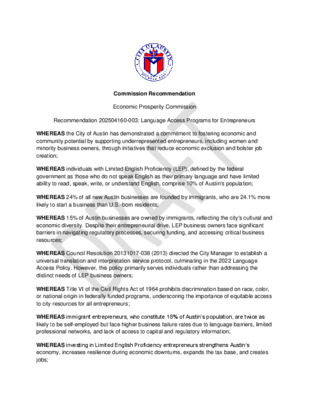Item 3: Draft Recommendation — original pdf
Backup

Commission Recommendation Economic Prosperity Commission Recommendation 202504160-003: Language Access Programs for Entrepreneurs WHEREAS the City of Austin has demonstrated a commitment to fostering economic and community potential by supporting underrepresented entrepreneurs, including women and minority business owners, through initiatives that reduce economic exclusion and bolster job creation; WHEREAS individuals with Limited English Proficiency (LEP), defined by the federal government as those who do not speak English as their primary language and have limited ability to read, speak, write, or understand English, comprise 10% of Austin's population; WHEREAS 24% of all new Austin businesses are founded by immigrants, who are 24.1% more likely to start a business than U.S.-born residents; WHEREAS 15% of Austin businesses are owned by immigrants, reflecting the city's cultural and economic diversity. Despite their entrepreneurial drive, LEP business owners face significant barriers in navigating regulatory processes, securing funding, and accessing critical business resources; WHEREAS Council Resolution 20131017-038 (2013) directed the City Manager to establish a universal translation and interpretation service protocol, culminating in the 2022 Language Access Policy. However, this policy primarily serves individuals rather than addressing the distinct needs of LEP business owners; WHEREAS Title VI of the Civil Rights Act of 1964 prohibits discrimination based on race, color, or national origin in federally funded programs, underscoring the importance of equitable access to city resources for all entrepreneurs; WHEREAS immigrant entrepreneurs, who constitute 18% of Austin’s population, are twice as likely to be self-employed but face higher business failure rates due to language barriers, limited professional networks, and lack of access to capital and regulatory information; WHEREAS investing in Limited English Proficiency entrepreneurs strengthens Austin’s economy, increases resilience during economic downturns, expands the tax base, and creates jobs; WHEREAS the Economic Development Department’s Community Navigator Program, which provided critical business support services, ended in December 2024, leaving a gap in resources for immigrant business owners; WHEREAS popular programs for English-speaking entrepreneurs, such as the BizAid Business Orientation, have not been offered in Spanish in the past 12 months due to a lack of awareness among existing and new limited english proficiency businesses. BizAid Business is an introductory class designed to equip aspiring business owners with the knowledge and resources needed to navigate the complex landscape of city, state, and federal regulations, as well as gain insights into the City of Austin's development process for commercial properties; WHEREAS immigrant-owned businesses in Texas employ over 635,000 workers and generate $104.1 billion in annual sales. In peer cities such as Houston, immigrants comprise 24% of the population but own 42% of businesses. These enterprises significantly contribute to economic growth, demonstrating the potential impact of similar investment in Austin; WHEREAS Austin is the nation’s 10th largest city and the second-fastest-growing major metropolitan area. Texas has the highest share of immigrant entrepreneurs with limited English proficiency in the nation, reinforcing the need for targeted support to ensure equitable business success; WHEREAS community partners have established trust with LEP entrepreneurs and are critical to delivering services. They are especially important to aid in the delivery of recommendations on this letter at a time when multilingual individuals and immigrants may have reduced trust in government and may be reluctant to share information with government employees WHEREAS peer cities have implemented successful programs to support immigrant entrepreneurs, including: ● Louisville, which provides mentors and coaches for hands-on guidance during startup phases; ● Philadelphia, which employs technical experts to assist entrepreneurs with licensing, inspections, zoning, and regulatory processes; ● Chicago, which has created one-stop-shop neighborhood centers and industry-specific startup guides in multiple languages to simplify the application process and reduce regulatory conflicts; ● Baltimore, Cincinnati, Detroit, and St. Louis, which collaborate with local chambers of commerce to connect immigrant entrepreneurs with the entrepreneurial ecosystem; ● Washington, D.C., which partners with Community Development Financial Institutions (CDFIs) for microlending initiatives. NOW, THEREFORE, BE IT RESOLVED that the Economic Prosperity Commission recommends the City of Austin re-establish the Community Navigator Program to provide multilingual business support by partnering with trusted community organizations. This initiative should offer guidance on obtaining capital, understanding local regulations, securing permits, and overcoming other barriers. BE IT FURTHER RESOLVED that the City expand data collection efforts to assess the effectiveness of existing language access programs for entrepreneurs, identify gaps, and tailor resources to better meet the needs of LEP business owners. The City should conduct a survey to determine the economic impact of these services, including startup and business closure rates for LEP businesses and their overall effect on the local economy. BE IT FURTHER RESOLVED that the City conduct an audit of frequently used business resources that are not automatically translated, ensuring accessibility for entrepreneurs who face similar obstacles, such as low-income entrepreneurs and entrepreneurs of color. BE IT FURTHER RESOLVED that the City develop multilingual business guides for key sectors, introduce LEP programming for construction businesses aligned with existing Infrastructure Academy initiatives, and establish an Immigrant Entrepreneur Week to raise awareness of available programs. Record of the vote: Motioned by: Seconded by: Vote: For: Against: None Abstain: None Absent: Attest: ________________________________________